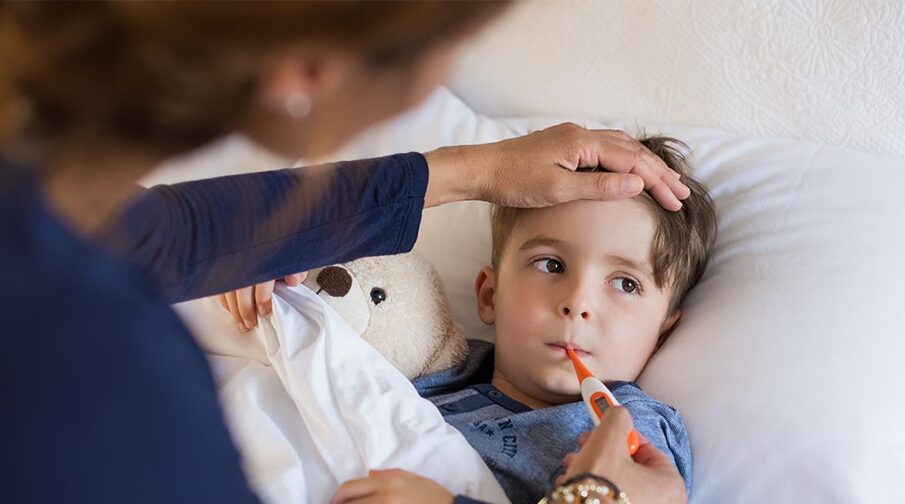How Long Should a Fever Last in Kids?

Fevers are among the most common reasons parents bring their children to the doctor. While a mild temperature may not be a cause for concern, it’s natural to worry when a fever persists. Understanding how long a fever typically lasts in children—and when it signals something more serious—can help parents make informed decisions and act promptly when needed.
What Is Considered a Fever in Children?
In general, a fever is defined as a body temperature higher than 38°C (100.4°F) when measured orally. For children, especially those under the age of five, fevers can result from various minor infections. These include colds, sore throats, ear infections, and even teething in infants. While a fever is not a disease itself, it is the body’s natural response to fighting off infection, signaling that the immune system is at work.
Typical Duration of a Fever
Most fevers in children resolve on their own within three to five days. In viral infections, which are the most common cause, the fever may come and go over a few days but generally starts to taper off as the virus runs its course. If your child’s energy levels improve, appetite returns, and they’re more alert despite a mild fever, these are good signs that recovery is near.
Bacterial infections, however, may cause longer-lasting or higher-grade fevers and usually require medical treatment such as antibiotics. Monitoring your child’s fever pattern can give you clues about whether the cause is likely viral or bacterial.
When to See a Doctor
If your child’s fever lasts more than five days, it’s advisable to seek medical advice. Additionally, if your child is younger than three months old and develops a fever, you should contact your doctor immediately. For older children, it’s not just the duration of the fever that matters but also the accompanying symptoms.
If the fever is paired with symptoms such as persistent vomiting, rash, difficulty breathing, or extreme lethargy, a medical evaluation is warranted. Children with chronic medical conditions or weakened immune systems should also be seen by a doctor earlier in the course of a fever, as they may be more vulnerable to complications.
Managing Children Fever at Home
In many cases, you can manage children’s fever at home with proper care. Make sure your child stays hydrated with water, milk, or electrolyte solutions. Dress them in light clothing and keep their room at a comfortable temperature. Fever-reducing medications like paracetamol or ibuprofen can help lower the temperature and improve comfort, but it’s important to use the correct dosage for your child’s age and weight.
Avoid giving aspirin to children, as it has been associated with a rare but serious condition called Reye’s syndrome. If you’re unsure about medications or dosages, consult your healthcare provider.
Understanding Fever Patterns
A fever that fluctuates throughout the day may still be considered normal. Some fevers spike at night and return to normal in the morning, which is typical of viral infections. However, persistent high fevers (above 39.5°C or 103.1°F) or fevers that don’t respond to medications should be monitored closely.
In some cases, especially with prolonged or recurring fevers, your doctor might investigate other underlying causes such as urinary tract infections, autoimmune diseases, or even rare conditions like Kawasaki disease.
Preventive Measures to Reduce Infections
Since most fevers are caused by infections, prevention can go a long way. Teach your child to practice good hygiene—frequent handwashing, covering the mouth when coughing or sneezing, and not sharing utensils. Staying up to date with vaccinations also plays a key role in preventing illnesses that commonly cause fever.
A healthy diet, regular sleep, and physical activity help build a strong immune system, allowing children to better fight off infections. While you can’t completely eliminate the risk of illness, reducing exposure and maintaining overall health can lessen the frequency and severity of fevers.
When Fevers Become Recurrent
If your child experiences repeated episodes of fever over a short span of time, it’s important to keep a log and discuss it with your pediatrician. Recurrent fevers may indicate an underlying condition that requires further evaluation. The doctor may recommend blood tests or imaging studies to identify any chronic or hidden issues.
Conclusion
While fevers can be unsettling, they are often a normal part of childhood illness and recovery. Knowing what’s typical and what’s not helps parents stay calm and take the right steps when caring for their little ones. Most cases of children fever resolve without complications, but it’s always best to trust your instincts and seek medical attention when something doesn’t feel right.











